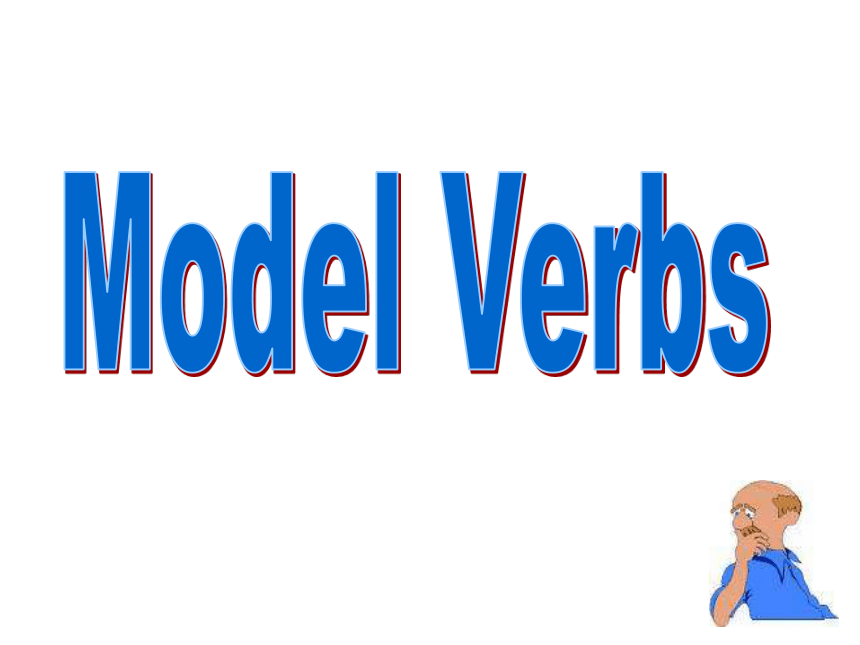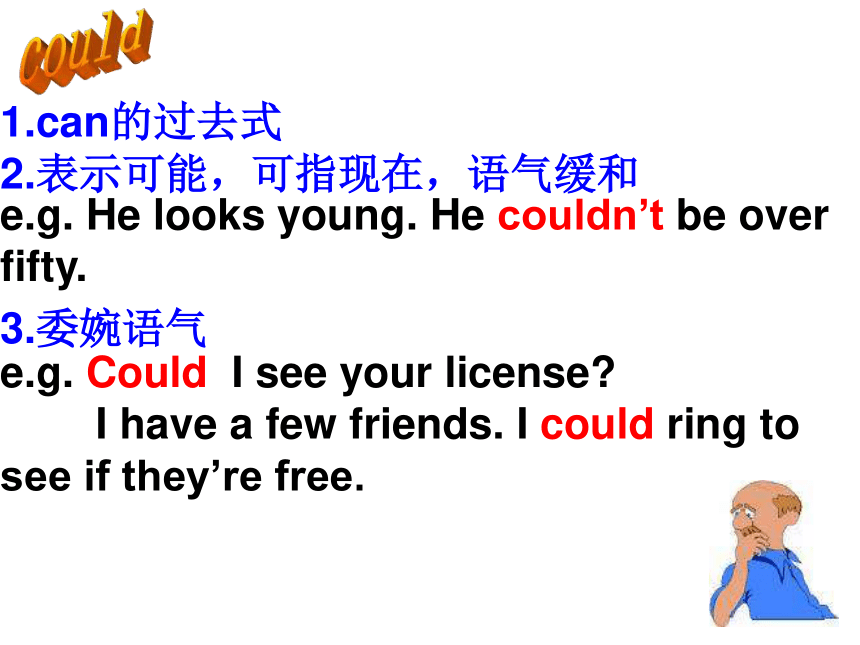modal verbs[下学期]
图片预览









文档简介
课件23张PPT。Model VerbsA List of Modal Verbs
can/could , may/might, must, have to, ought to , will, would, shall, should, dare (to), need can1.表示能力
2.否定/疑问句表示推测e.g. That computers can recognize
human voices surprises many people.e.g. They can’t have a lot of money.3.客观可能性,用于肯定句
4.否定,疑问,感叹句:惊讶,怀疑,不相信
5.=may表示允许-口语e.g. As a human being, anyone can make
a mistake.e.g. This can’t be true.
Can this be an excuse for not giving
them help?e.g. Can I have a look at your book?
You can go now.couldcan的过去式
表示可能,可指现在,语气缓和
委婉语气e.g. He looks young. He couldn’t be over
fifty.e.g. Could I see your license?
I have a few friends. I could ring to
see if they’re free.can & be able to 经努力具体做成功一件事情要用_____________.be able tomay1.询问可不可以做某事。
May I …? Yes, _______________.
No, _______________.you mayyou mustn’t
you’d better not
you may not2. 表示可能性。
e.g. He may not be at home. must-can-may-mightmightmay的过去式。
表示可能性。语气非常微弱。
I’m not sure.
I’ll go and check it.…
3.表示 婉转客气。
e.g. I wonder if I might borrow some
coffee.must1.表示必须要做的事情。
e.g. We must do everything step by step.
Must we send in our plan this week?
-- Yes, _____________.
-- No, ______________.you must
you needn’t
you don’t have to2.只在肯定句中表示猜测—“想必,一定”e.g. This must be your room.must & have to人的主观决定或看法用___________
客观需要用____________musthave toe.g. The car is broken down. We’ll
______________ go on foot.
You ____________ know what your
duty is.have tomustshould 和 ought to1.表示应该做某事。
2.表示推测—“应该,估计”。语气比must弱。e.g.I think you should/ought to start the
work at once.e.g. Mr. Black must be home by now.
Mr. Black should/ought to be home
by now.一定到家了(肯定)应该到家了(估计)shall用于一、三人称,表示征求意见或请求指
示。
2.用于二、三人称,表示“命令、警告、威胁
强制、允诺、决心 “。e.g. Shall we sit here?
Shall the boy wait outside?
Shall they have a try?
Let’s make it today, shall we?will1.表示“意志,意愿”。
e.g. Who will go with me?
I will do anything for our soldiers.
2. will you –表示征询对方意见或请求
e.g. Will you open the door for me?
Pass me the glass, will you?
3.表示倾向或习惯性动作,可译为
“总是会,老是,就是”wouldwill的过去式。
委婉地提出看法,请求,建议。语气比
will婉转。
e.g. Would you like me to carry it for you?
That would be kind of you.
I’m afraid the journey would be too
expensive.
3.表示“过去常常”used to1.表示“过去常常”疑问/否定句有两种形式。e.g. Used you to go to school on foot?
Did you use to go to school on foot?
I usedn’t to go to school on foot.
I didn’t use to go to school on foot.e.g. When we were children we
____________ go skating every winter.
I ________________ have an old
jeep.would/used toused toneedNeed I come? Yes, _________.
No, _________.you mustyou needn’t2. need做及物动词,和不定式连用。 Does he need to know it?
= Need he know it?
You don’t need to do it yourself.
= You needn’t do it yourself.dare1.dare表示“敢于”,用于疑问句、否定句和
条件句中。
e.g. Dare you go home alone?
She dare not say what she thinks.
I’ll support you if you dare do it.2. I dare say… “我敢说”
3.dare可以做不及物动词,后跟不定式
e.g. I wonder how he dared to say so.
=…………………he dare say so.否定句中不定式to可以省略。e.g. I didn’t dare (to) look up.
They don’t dare (to) speak. 1. I don't know where she is, she _______ be in
Wuhan.
2. At this moment, our teacher ________________
our exam papers.
这时,我们老师想必在批改试卷。
3. The road is wet. It ________________ last night.
(rain)
4. Your mother ______________________ for you.
你妈妈一定一直在找你。may/mightmust be markingmust have rainedmust have been looking5. Philip ________________________ seriously in
the car accident. 菲利普可能在车祸中受了重伤.
6. ---Linda has gone to work, but her bicycle is
still here.
---She _____________________ (go) by bus.
7. Mike ________________ his car, for he came to
work by bus this morning.
迈克一定还没有找回他的车,因为早上他是坐
公共汽车来上班的。may (might) have been hurtmay (might) have gonecan’t have found高考考题:
1. I thought you _____like something to read, so
I have brought you some books.
A. may B. might C. would D. must
2. Where is my pen? I ____it.
A. might lose B. would have lost
C. should have lost D. must have lost
3. I didn’t hear the phone. I ___asleep
A. must be B. must have been
C. should be D. should have been4. ---There were already five people in the car,
but they managed to take me as well.
----It ____a comfortable journey
A. can’t be B. shouldn’t be
C. mustn’t have been D. couldn’t have been
5. It’s nearly seven o’clock . Jack ___be here at
any moment.
A. must B. need C. should D. can6. A computer ______ think for itself; it must
be told what to do.
A. can’t B. couldn’t
C. may not D. might not7. The fire spread through the hotel very quickly
but everyone ______ get out.
A. had to B. would
C. could D. was able to8. They will ______ run this machine on their
own in three months.
A. can B. could C. may D. be able to
9. That big cinema ______ seat 2,000 people.
A. can B. should C. ought to D. is able to10. — Could I borrow your dictionary?
— Yes, of course you _______.
A. might B. will C. can D. should
11. — Might I watch TV after supper?
— Yes, you ________.
A. may B. must C. might D. can
can/could , may/might, must, have to, ought to , will, would, shall, should, dare (to), need can1.表示能力
2.否定/疑问句表示推测e.g. That computers can recognize
human voices surprises many people.e.g. They can’t have a lot of money.3.客观可能性,用于肯定句
4.否定,疑问,感叹句:惊讶,怀疑,不相信
5.=may表示允许-口语e.g. As a human being, anyone can make
a mistake.e.g. This can’t be true.
Can this be an excuse for not giving
them help?e.g. Can I have a look at your book?
You can go now.couldcan的过去式
表示可能,可指现在,语气缓和
委婉语气e.g. He looks young. He couldn’t be over
fifty.e.g. Could I see your license?
I have a few friends. I could ring to
see if they’re free.can & be able to 经努力具体做成功一件事情要用_____________.be able tomay1.询问可不可以做某事。
May I …? Yes, _______________.
No, _______________.you mayyou mustn’t
you’d better not
you may not2. 表示可能性。
e.g. He may not be at home. must-can-may-mightmightmay的过去式。
表示可能性。语气非常微弱。
I’m not sure.
I’ll go and check it.…
3.表示 婉转客气。
e.g. I wonder if I might borrow some
coffee.must1.表示必须要做的事情。
e.g. We must do everything step by step.
Must we send in our plan this week?
-- Yes, _____________.
-- No, ______________.you must
you needn’t
you don’t have to2.只在肯定句中表示猜测—“想必,一定”e.g. This must be your room.must & have to人的主观决定或看法用___________
客观需要用____________musthave toe.g. The car is broken down. We’ll
______________ go on foot.
You ____________ know what your
duty is.have tomustshould 和 ought to1.表示应该做某事。
2.表示推测—“应该,估计”。语气比must弱。e.g.I think you should/ought to start the
work at once.e.g. Mr. Black must be home by now.
Mr. Black should/ought to be home
by now.一定到家了(肯定)应该到家了(估计)shall用于一、三人称,表示征求意见或请求指
示。
2.用于二、三人称,表示“命令、警告、威胁
强制、允诺、决心 “。e.g. Shall we sit here?
Shall the boy wait outside?
Shall they have a try?
Let’s make it today, shall we?will1.表示“意志,意愿”。
e.g. Who will go with me?
I will do anything for our soldiers.
2. will you –表示征询对方意见或请求
e.g. Will you open the door for me?
Pass me the glass, will you?
3.表示倾向或习惯性动作,可译为
“总是会,老是,就是”wouldwill的过去式。
委婉地提出看法,请求,建议。语气比
will婉转。
e.g. Would you like me to carry it for you?
That would be kind of you.
I’m afraid the journey would be too
expensive.
3.表示“过去常常”used to1.表示“过去常常”疑问/否定句有两种形式。e.g. Used you to go to school on foot?
Did you use to go to school on foot?
I usedn’t to go to school on foot.
I didn’t use to go to school on foot.e.g. When we were children we
____________ go skating every winter.
I ________________ have an old
jeep.would/used toused toneedNeed I come? Yes, _________.
No, _________.you mustyou needn’t2. need做及物动词,和不定式连用。 Does he need to know it?
= Need he know it?
You don’t need to do it yourself.
= You needn’t do it yourself.dare1.dare表示“敢于”,用于疑问句、否定句和
条件句中。
e.g. Dare you go home alone?
She dare not say what she thinks.
I’ll support you if you dare do it.2. I dare say… “我敢说”
3.dare可以做不及物动词,后跟不定式
e.g. I wonder how he dared to say so.
=…………………he dare say so.否定句中不定式to可以省略。e.g. I didn’t dare (to) look up.
They don’t dare (to) speak. 1. I don't know where she is, she _______ be in
Wuhan.
2. At this moment, our teacher ________________
our exam papers.
这时,我们老师想必在批改试卷。
3. The road is wet. It ________________ last night.
(rain)
4. Your mother ______________________ for you.
你妈妈一定一直在找你。may/mightmust be markingmust have rainedmust have been looking5. Philip ________________________ seriously in
the car accident. 菲利普可能在车祸中受了重伤.
6. ---Linda has gone to work, but her bicycle is
still here.
---She _____________________ (go) by bus.
7. Mike ________________ his car, for he came to
work by bus this morning.
迈克一定还没有找回他的车,因为早上他是坐
公共汽车来上班的。may (might) have been hurtmay (might) have gonecan’t have found高考考题:
1. I thought you _____like something to read, so
I have brought you some books.
A. may B. might C. would D. must
2. Where is my pen? I ____it.
A. might lose B. would have lost
C. should have lost D. must have lost
3. I didn’t hear the phone. I ___asleep
A. must be B. must have been
C. should be D. should have been4. ---There were already five people in the car,
but they managed to take me as well.
----It ____a comfortable journey
A. can’t be B. shouldn’t be
C. mustn’t have been D. couldn’t have been
5. It’s nearly seven o’clock . Jack ___be here at
any moment.
A. must B. need C. should D. can6. A computer ______ think for itself; it must
be told what to do.
A. can’t B. couldn’t
C. may not D. might not7. The fire spread through the hotel very quickly
but everyone ______ get out.
A. had to B. would
C. could D. was able to8. They will ______ run this machine on their
own in three months.
A. can B. could C. may D. be able to
9. That big cinema ______ seat 2,000 people.
A. can B. should C. ought to D. is able to10. — Could I borrow your dictionary?
— Yes, of course you _______.
A. might B. will C. can D. should
11. — Might I watch TV after supper?
— Yes, you ________.
A. may B. must C. might D. can
